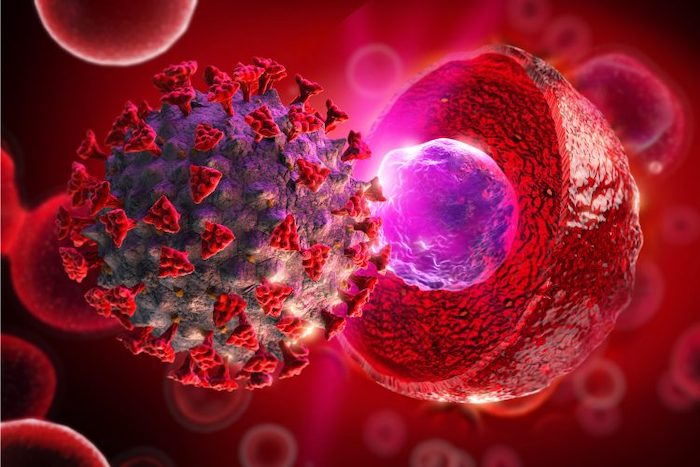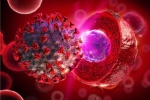
Most COVID‐19 patients do not develop any major clinical symptoms during the early stages of infection. Common symptoms include mild or high temperature, cough, sore throat, muscle distress, and body pain. In a few patients, shortness of breath can lead to a sudden deterioration in the health of the patient during the later stages of the disease. In severe cases, immune system dysfunction is the major cause of death in patients as infection stimulates inflammatory cytokines that result in the respiratory system being overwhelmed by a storm of inflammatory cytokines such as interleukin 2 (IL‐2), IL‐6, granulocyte colony-stimulating factor, IP10, MCP1, MIP1A, and tumor necrosis factor. In COVID‐19, the immune system seems unable to turn itself off and produces an excessive quantity of cytokines, thus producing an inimical environment for the infection. Such an unchecked inflammation caused by this cytokine storm compromises lung function and patients have difficulty breathing and eventually die. The cytokine storm can lead to organ failure followed by edema, secondary infection, cardiac damage, and ARDS. MSCs are thought to balance the immune system and stop its overactivation. Such a balance of the immune system is very important, as complete shutting down of the immune system will affect the infection‐fighting ability of patients.
Control of COVID‐19‐induced cytokine storm during infection can save patients, as shown by anecdotal reports of successful treatment of patients with anti‐IL‐6 receptor monoclonal antibodies. MSCs possess powerful anti‐inflammatory and immunomodulatory properties and therefore can also control cytokine storms by inhibiting overactivation of the immune system and by improving endogenous repair of injured tissues. MSCs possess special immunoregulatory properties that enable these cells to modulate the functions of various immune cells.
MSCs are also able to alter the innate and adaptive immune responses. Previous studies indicated that MSCs can induce mature dendritic cells (DCs) into novel Jagged‐2 dependent regulatory DCs. These regulatory DCs not only play an important role in immune homeostasis but are immunosuppressive. In one of the initial MSC‐based clinical studies for COVID‐19, it was found that the number of regulatory DC was increased significantly after MSC transplantation. Furthermore, MSC transplantation leads to decreased TNF‐α levels and increased IL‐10 levels in critically ill COVID‐19 patients in the MSC treatment group compared to the placebo control group.
The immunomodulatory properties of MSCs are due to low levels of MHC class 1 antigen concurrent with the release of IFN‐γ, indoleamine 2,3‐dioxygenase, transforming growth factor β, IL‐6, IL‐10, and prostaglandin E2. With these properties MSCs can inhibit the differentiation of monocytes into DCs, can increase the ratio of regulatory cytokines to inflammatory cytokines, and can inhibit antibody production by B cells and proliferation of the natural killer cells.
The safety and effectiveness of MSCs in life‐threatening immune‐mediated inflammatory diseases such as GvHDs and systemic lupus erythematosus have previously been documented through various clinical trials. An overall increase in survival of GvHD patients was observed after MSC administration. Furthermore, the efficacy of MSC has also been documented for the treatment of ARDS induced by H9N2 avian influenza viruses, and H5N1 infections in mice and humans.
If MSCs can reduce the incidence and severity of other virus‐related diseases, they might prevent overactivation of the immune system, lower levels of inflammatory substances, and regenerate the damaged tissues in COVID‐19 patients. Systemic administration of MSCs results in homing to the pulmonary vascular bed where they release soluble factors such as anti‐inflammatory cytokines, antimicrobial peptides, angiogenic growth factors, and extracellular vesicles and thus could improve the pulmonary microenvironment, protect alveolar epithelial cells, prevent pulmonary fibrosis, and improve overall lung function. Also, the repair of immune and respiratory epithelial cells can occur by direct transfer of mitochondria from MSCs. Previous studies have shown that mitochondrial transfer from MSCs can repair the tubular epithelial cells in diabetic nephropathy.
Angiotensin‐converting enzyme 2 (ACE2) is the main receptor for SARS‐COV‐2 (the virus that causes COVID‐19) expressed by many types of human cells such as alveolar type 2 cells and capillary epithelium cells. SARS‐COV‐2 infects these cells but not bone marrow, lymph nodes, thymus, spleen, and immune cells (such as T and B lymphocytes and macrophages) being negative for ACE2. This receptor plays an important role in the entry of SARS‐COV‐2 into these cells. Recognition of the ACE2 receptor by viral spike protein is the first step in SARS‐COV‐2 pathogenesis. Another cellular serine protease TMPRSS2 is essential for the entry of the COVID‐19 virus into host cells. Interestingly, a recent study indicated that MSCs are negative for ACE2 and TMRSS2 and thus could have a natural resistance to SARS‐COV‐2. Previously published clinical data of MSC use for virus‐induced ARDS provides a hint for the success of stem cell‐based therapies for COVID‐19. Overall, the immunomodulatory and regenerative properties of MSCs can help inpatient recovery by modulating the immune system and by repairing the damaged tissue in the lungs. Promising results of preclinical studies suggest MSCs are safe and effective therapeutic agents for several diseases and disorders. Based on recent promising results of MSC use in COVID‐19 patients in Chinese studies and the overall safety and effectiveness of its use in several American and European clinical trials, the FDA had granted permission for compassionate use of MSCs.
Precision Pain Care and Rehabilitation has two convenient locations in Richmond Hill – Queens and New Hyde Park – Long Island. Call the Richmond Hill office at (718) 215-1888, or (516) 419-4480 for Long Island office, to arrange an appointment with our Interventional Pain Management Specialist, Dr. Jeffrey Chacko.













